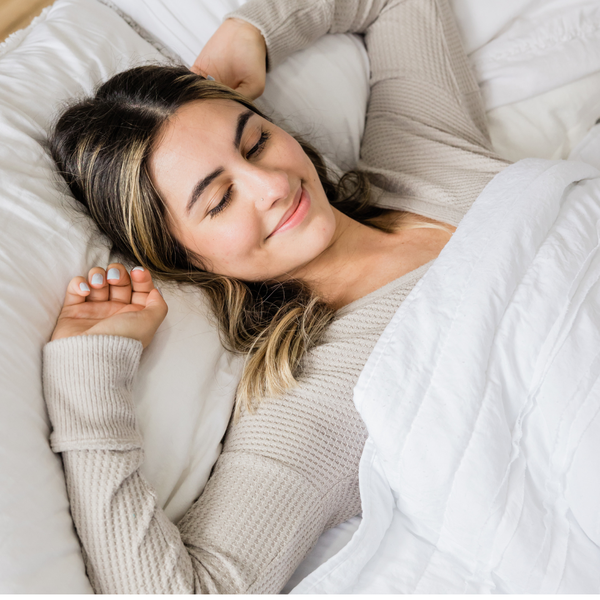March is National Sleep Awareness Month. It's the perfect opportunity to improve our sleep hygiene.
6 Tips for Better Sleep
Are you struggling to sleep? You're not alone.
Sleep is a main pillar of health and a fundamental aspect of our well-being. Yet so many of us struggle to get the rest we need. It has become increasingly difficult to unwind and relax in our world which leads to restless nights, groggy mornings, mood issues and coping methods that further impair our restorative sleep cycle.
Fortunately, there are things that you can do right now that can help you improve your sleep hygiene and get the rest and rejuvenation you need for better physical, mental and emotional health.
In honor of National Sleep Awareness Month, here are our top six tips for better sleep:
1. Develop a bedtime routine and schedule
The human body thrives on routine, and this includes sleep. Going to bed and waking up at the same time each day helps regulate your body's internal clock and improve the quality of your sleep. Aim for 7-8 hours of sleep per night and try to maintain this schedule even on weekends and days off.
Having a relaxing bedtime routine and schedule will signal to your body and mind that it's time to wind down and prepare for sleep. Read a book, journal or practice relaxation techniques such as meditation or deep breathing. These all help calm your mind and prepare your system for sleep.
Make sleep a priority.
2. Create a Calming Environment
Your sleep environment can have a significant impact on your ability to fall asleep and stay asleep! Keep your bedroom cool, dark and quiet to promote deep relaxation. Avoid using electronics in bed as the blue light emitted by screens disrupts your natural sleep-wake cycle. When you're in a calm and relaxing environment, your body can more easily transition into sleep mode. By creating an environment conducive to sleep, you can signal to your body and mind that it's time to wind down and get ready for rest.
3. Exercise Regularly
Regular exercise can improve the quality of your sleep by reducing anxiety and promoting feelings of relaxation. Exercise reduces the stress hormone cortisol which contributes to feelings of anxiety that make it harder to fall asleep.
Exercise also helps regulate the body's natural sleep-wake cycle, known as the circadian rhythm. Exercising at the same time each day helps set a consistent schedule for your body, making it easier to fall asleep and wake up at the same time each day.
Deep sleep is the most restorative stage of sleep, helping to repair and regenerate the body. Regular exercise has been shown to increase the amount of time spent in deep sleep, which can lead to feeling more refreshed and energized upon waking.
Be sure to finish exercise a few hours before bedtime to give your body time to cool down internally.
4. Limit Caffeine and Alcohol
Caffeine and alcohol can disrupt your sleep by interfering with your body's natural sleep-wake cycle and the depth of your sleep. Try to limit your intake of these substances, especially in the hours leading up to bedtime. Caffeine use can exacerbate sleep deprivation and reduce total sleep time resulting in daytime sleepiness. Alcohol disrupts the body's sleep process. Studies have shown that low alcohol intake reduced sleep quality by 9.3%. Moderate alcohol intake (2 drinks per day for men and one for women) reduced sleep quality by 24%. Heavy alcohol intake reduced sleep quality by nearly 40%.
5. Pay Attention to Light Exposure
Light plays a significant role in regulating our circadian rhythm, the body's natural sleep-wake cycle. Exposure to bright lights and to blue light suppresses the production of the hormone melatonin, which helps regulate sleep. To promote healthy sleep, expose yourself to bright light during the day. Even better if you can get outside into the natural light soon after you wake up for at least 20 minutes.
Limit your exposure to bright lights and screens, such as those on phones and computers, in the evening hours leading up to bedtime. Even better if you can get outside into the fading dusk light for at least 20 minutes - but dont come back into bright and blue lights! You want soft, dim light in the evening that promotes a calm and relaxing environment before bed
.
By paying attention to light exposure, you can help support your body's natural sleep-wake cycle and improve your sleep quality.
6. Use Scent and Aromatherapy
Aromatherapy is the use of essential oils to promote relaxation. It can improve sleep depth and quality. Lavender, roman chamomile, and bergamot are all popular essential oils for promoting sleep.
When you inhale these scents, they stimulate the olfactory nerve, which sends signals to the brain and triggers a relaxation response. This, in turn, can help reduce heart rate, lower blood pressure, and induce feelings of relaxation and sleepiness.
You can use them in an essential oil diffuser in your bedroom, add them to a warm bath or even apply them topically such as with this Sweet Dreams Room, Linen & Body Spray.
Just be sure to use high-quality, pure essential oils like these and follow proper safety guidelines. Overall, aromatherapy can be a natural and pleasant way to improve your sleep quality and promote overall well-being
In Conclusion:
Getting enough high-quality sleep is crucial for overall health and well-being. By implementing the six tips outlined in this article you can improve your sleep hygiene and enjoy better quality sleep. It’s important to remember that everyone’s sleep needs and preferences are different, so it may take some experimentation to find the tips that work best for you. Additionally, if you constantly struggle with sleep issues we encourage you to consult your healthcare team to rule out sleep apnea or any underlying medical conditions.
With some effort and focus on improving your sleep habits, you can learn to retrain your brain and prioritize getting the deep, restful sleep you need to feel your best.
Sleep better and sweet dreams!
CHECK OUT OUR MOST POPULAR CONTENT










